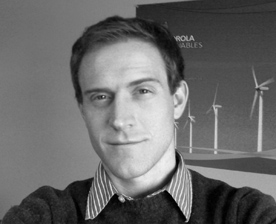Chase Whitney ’02 develops wind energy projects
Chase Whitney ’02 is a business developer for Iberdrola Renewables, the world’s largest owner and operator of wind energy facilities. Whitney majored in Environmental Studies and History at Cornell and now lives in Denver, Colo.
What does your job entail?

My job is to advance wind energy projects from varying stages of development to construction and operation. Some of these projects are early in the development process, and others are just a matter of months from construction. In the earliest stages, it is my responsibility to create and identify new project opportunities and begin the process of securing development rights. As the project matures, I ensure that all necessary legal agreements have been completed, all permits have been secured from participating authorities, and the project has received internal corporate approval.
What do you like most about your job?
I pursued a job in the renewable energy industry with an environmental motive and an appreciation for the power of markets. My job is a perfect mixture of creativity, optimism, and economic reality. Every day I have the pleasure of looking for business opportunities and strategies that will add value to the company and, hopefully, contribute to our nation’s growing renewable energy capacity. Equally pleasing is the fact that these opportunities need to be economically viable to succeed.
Any future plans?
My future plans have me staying in the energy sector and identifying profitable opportunities to address the myriad of challenges our society will face in the coming decades. As the pressures of limited fossil energy supplies, a growing population in both size and affluence, and environmental degradation begin to collide, the world will need to adapt and embrace new technologies and systems that work to align our economic goals with a finite world.
What was best about studying at Cornell?
Cornell provides students with the opportunity to immerse themselves in a variety of topics and to develop a passion for learning that may be more elusive in a larger and more traditional academic setting. My majors — U.S. History and Environmental Studies — offered classes that made it practically impossible not to be engaged. There were geology classes in the Bahamas and New Zealand that provided a broader understanding of the natural world and history classes that illustrated the effectiveness of pragmatic and enlightened leadership.
Any notable experiences as a student?
I took every available opportunity to participate in off-campus study. The ability of the OCAAT schedule to incorporate off-campus destinations is invaluable and one of the reasons I decided to attend Cornell. Over the course of four years, I took courses that traveled to Washington D.C., Chicago, the Florida Keys, and the Bahamas. I remained involved even after graduation and attended a geology class in New Zealand for a month.
Cornell is absolutely unique in its ability to incorporate tangible experience into the traditional classroom. Whether it be meeting a Supreme Court Justice during a course on government and politics, or in one glance seeing two coral reefs, one submerged and the other on the beach, to illustrate past climate change, Cornell has the ability to illuminate a subject unlike any other institution.



